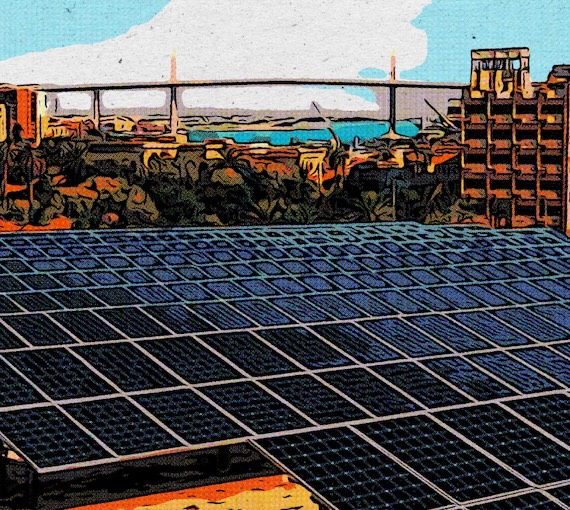Ann Arbor (Informed Comment) – Iraqi farmers, tired of high electricity bills and frequent blackouts, are turning to solar panels, according to Khalid Al-Mousuly at Reuters. Farmers need electricity to run water pumps for irrigation.
It isn’t just the farmers. With nearly a gigawatt annually in solar panel imports, Iraq has emerged as the third-largest importer of Chinese panels, which are on a fire sale because of recent overproduction. It ranks just behind oil giants Saudi Arabia and the United Arab Emirates for such imports.
The Iraqi government is partnering with France’s TotalEnergies to install a 250-megawatt utility solar plant at Basra that will come into operation before the end of the year. The plant will then be expanded to 1 gigawatt in output. It will eventually have 2 million solar panels.
The Iraqi government has a goal of 12 gigawatts of solar in total for the country by 2030. Over 7 gigawatts in project bids have already been let.
Preparations are being made for another mega-project, a massive 3-gigawatt solar farm to be built by the British-American firm UGT Renewables.
The Iraqi government, despite being a petro-state, openly admits the dangers of climate breakdown fueled by carbon pollution and the need to reduce emissions. In contrast, Saudi Arabia is a notorious climate change denialist that has funded misinformation campaigns to slow the adoption of renewables.
Iraq has plentiful sunshine and a lot of desert on which to place the panels. Solar plants can be built in just a couple of years, unlike gas power plants, which often take as many as five years to construct. The Iraqi state wants to build out its electricity production substantially, to meet growing demand. Its dependence on Iran for electricity may not be sustainable because the Trump administration has cancelled the waiver previously granted Iraq to do business with Iran in this way. Trump has Iran under maximum pressure sanctions.
Iraq, Saudi Arabia and the UAE are major petroleum exporters. But petroleum is primarily used to fuel cars, trucks, trains, planes and other forms of transportation. Relatively few electricity power plants are fueled by petroleum, which is expensive for the purpose.
Electricity in the Gulf is mostly provided by fossil gas plants. Either the gas is locally produced or imported from Qatar (many oil states have relatively few gas resources). Some electricity in Iraq also comes from hydroelectric dams. Renewables so far account for a tiny proportion of Iraqi electricity production, but that situation looks set to change rapidly.
Since the United Nations and United States sanctions imposed on Iraq after the occupation of Kuwait and the 1991 Gulf War that ended it, the Iraqi government has never had the resources to build enough power plants to meet the needs of the needs of the country. The long American occupation after 2003 and the guerrilla movements it provoked threw the country into chaos, slowing such infrastructural building. Iraq ended up importing electricity from Iran. It may also be that the Iraqi government’s notorious corruption problems have siphoned off funds that could have been used for building power plants.
Electricity in Iraq is therefore rationed. Al-Mousuly reports that most Iraqis only get a half day of electricity in the summer, even though temperatures are reaching 104º F. — imagine not having air conditioning!
Many Iraqis are just not going to wait any longer for the government to supply them inexpensive and reliable electricity, and with the current cheapness of Chinese solar panels, they are able to just do it themselves. This movement toward villagers importing and installing vast numbers of Chinese solar panels can be seen in other nearby countries such as Pakistan, where farmers put in a whopping 17 gigawatts of solar last year.

“Imagining Solar in Basra,” Digital, ChatGPT / Clip2Comic, based in part on photo by حسن on Unsplash
Wheat grower Ali Abdullah said that he had been paying over $700 a month for electricity for his farm, but after putting in the solar panels his bill fell to some $64 a month, according to Reuters. Moreover, now he actually gets the electricity he is paying for.
The vogue for solar is sweeping other areas of Iraq, too, such as Kurdistan, where the Kurdistan Regional Government (KRG) is also increasingly committed to solar. But many homeowners are putting in $2000 rooftop solar installations, pairing them with lead-acid or lithium batteries. They can thereby just go off the unreliable grid entirely and don’t have to worry whether the KRG electricity will end up being expensive.


 © 2026 All Rights Reserved
© 2026 All Rights Reserved